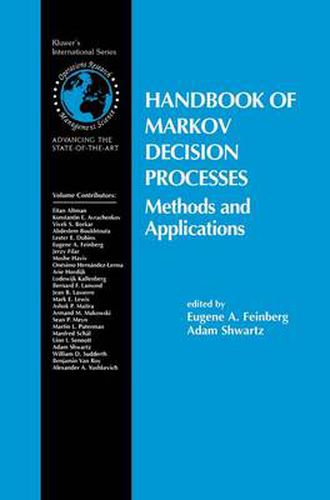Readings Newsletter
Become a Readings Member to make your shopping experience even easier.
Sign in or sign up for free!
You’re not far away from qualifying for FREE standard shipping within Australia
You’ve qualified for FREE standard shipping within Australia
The cart is loading…






This title is printed to order. This book may have been self-published. If so, we cannot guarantee the quality of the content. In the main most books will have gone through the editing process however some may not. We therefore suggest that you be aware of this before ordering this book. If in doubt check either the author or publisher’s details as we are unable to accept any returns unless they are faulty. Please contact us if you have any questions.
The theory of Markov Decision Processes - also known under several other names including sequential stochastic optimization, discrete-time stochastic control, and stochastic dynamic programming - studies sequential optimization of discrete time stochastic systems. Fundamentally, this is a methodology that examines and analyzes a discrete-time stochastic system whose transition mechanism can be controlled over time. Each control policy defines the stochastic process and values of objective functions associated with this process. Its objective is to select a good control policy. In real life, decisions that humans and computers make on all levels usually have two types of impacts: (i) they cost or save time, money, or other resources, or they bring revenues, as well as (ii) they have an impact on the future, by influencing the dynamics. In many situations, decisions with the largest immediate profit may not be good in view of future events. Markov Decision Processes (MDPs) model this paradigm and provide results on the structure and existence of good policies and on methods for their calculations. MDPs are attractive to many researchers because they are important both from the practical and the intellectual points of view. MDPs provide tools for the solution of important real-life problems. In particular, many business and engineering applications use MDP models. Analysis of various problems arising in MDPs leads to a large variety of interesting mathematical and computational problems. Accordingly, the Handbook of Markov Decision Processes is split into three parts: Part I deals with models with finite state and action spaces and Part II deals with infinite state problems, and Part III examines specific applications. Individual chapters are written by leading experts on the subject.
$9.00 standard shipping within Australia
FREE standard shipping within Australia for orders over $100.00
Express & International shipping calculated at checkout
This title is printed to order. This book may have been self-published. If so, we cannot guarantee the quality of the content. In the main most books will have gone through the editing process however some may not. We therefore suggest that you be aware of this before ordering this book. If in doubt check either the author or publisher’s details as we are unable to accept any returns unless they are faulty. Please contact us if you have any questions.
The theory of Markov Decision Processes - also known under several other names including sequential stochastic optimization, discrete-time stochastic control, and stochastic dynamic programming - studies sequential optimization of discrete time stochastic systems. Fundamentally, this is a methodology that examines and analyzes a discrete-time stochastic system whose transition mechanism can be controlled over time. Each control policy defines the stochastic process and values of objective functions associated with this process. Its objective is to select a good control policy. In real life, decisions that humans and computers make on all levels usually have two types of impacts: (i) they cost or save time, money, or other resources, or they bring revenues, as well as (ii) they have an impact on the future, by influencing the dynamics. In many situations, decisions with the largest immediate profit may not be good in view of future events. Markov Decision Processes (MDPs) model this paradigm and provide results on the structure and existence of good policies and on methods for their calculations. MDPs are attractive to many researchers because they are important both from the practical and the intellectual points of view. MDPs provide tools for the solution of important real-life problems. In particular, many business and engineering applications use MDP models. Analysis of various problems arising in MDPs leads to a large variety of interesting mathematical and computational problems. Accordingly, the Handbook of Markov Decision Processes is split into three parts: Part I deals with models with finite state and action spaces and Part II deals with infinite state problems, and Part III examines specific applications. Individual chapters are written by leading experts on the subject.